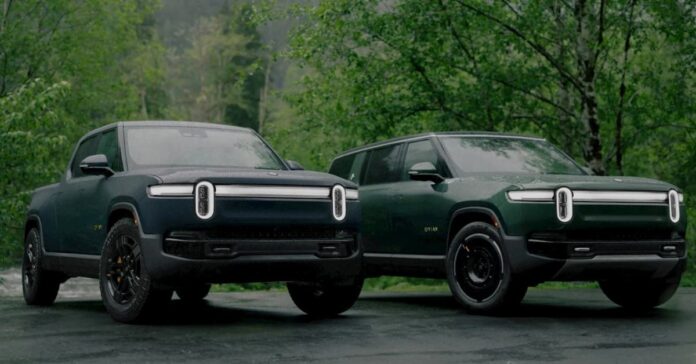VW and Rivian have just announced that the two companies will form a joint venture, bringing Rivian’s software expertise to VW’s products and providing an initial $1 billion, and potentially up to an eventual $5 billion, in capital for Rivian to get through its push to deliver its upcoming R2 vehicle.
Rivian is currently working hard to get costs down in its quest for profitability. While the company has large cash reserves, it’s running through them at relatively rapid rate. The financials get a little bit better each quarter, but there is still a lot of work to be done.
Recently, Rivian announced that it would delay building its plant in Georgia in order to save over $2 billion in the short term, helping reduce pressure on its near-term financials.
Now, today, the company has had another pressure valve released, as VW and Rivian have announced they will form a joint venture to bring Rivian’s software to VW’s EVs, with VW offering an initial $1 billion in capital and potentially up to $5 billion by 2026.
“Our customers benefit from the targeted partnership with Rivian to create a leading technology architecture. Through our cooperation, we will bring the best solutions to our vehicles faster and at lower cost. We are also acting in the best interest of our strong brands, which will inspire with their iconic products. The partnership fits seamlessly with our existing software strategy, our products, and partnerships. We are strengthening our technology profile and our competitiveness.”
Oliver Blume, CEO of Volkswagen Group
The partnership is valuable for VW as well, as software has been its biggest issue recently. VW’s previous CEO, Herbert Diess, stepped down in 2022, and it’s thought that software issues were the main reason for his departure. In 2023, VW hired a former Rivian exec to help with software. It must have liked what it got, as the companies are deepening their relationship now.
The partnership begins with VW offering a $1 billion convertible note to Rivian, which will convert into an equity holding around the end of this year.
In addition, the two companies will establish a 50/50 joint venture around “next generation electrical/electronic architecture.” This will give VW immediate access to Rivian’s electronics architecture, which has been seen as one of the major strengths of the company.
“We’re very excited to be partnering with Volkswagen Group. Since the earliest days of Rivian, we have been focused on developing highly differentiated technology, and it’s exciting that one of the world’s largest and most respected automotive companies has recognized this. Not only is this partnership expected to bring our software and associated zonal architecture to an even broader market through Volkswagen Group’s global reach, but this partnership also is expected to help secure our capital needs for substantial growth. Rivian was created to help the world to transition away from fossil fuels through compelling products and services, and this partnership is beautifully aligned with that mission.”
RJ Scaringe, Founder and CEO of Rivian
After the establishment of this joint venture, VW says it will invest an additional $4 billion into Rivian, in $1 billion tranches in 2025 and 2026, contingent on Rivian meeting “certain milestones.”
After the announcement, RIVN stock is trading up more than 40% in after hours trading. It had already risen 8% during today’s trading session after an analyst upgrade. Rivian will hold an investor call at 3pm Pacific, 6pm eastern here, and you can read its investor letter here.
Electrek’s Take
This is great news for Rivian, and great news for VW as well.
However, Rivian has had a number of past partnerships that didn’t turn out.
Rivian had previously partnered with Ford to build Ford/Lincoln EVs and also with Mercedes to build electric vans. Both of those fell through, with the Mercedes deal including a joint venture and the Ford deal including a big investment which Ford later trimmed.
Rivian has also partnered with Amazon to deliver 100,000 delivery vans. That partnership is going well with over 10,000 vehicles delivered, but the exclusivity portion of the contract recently ran out, and now Rivian is looking for more purchasers.
In this case, though, I can see a direct reason for Voltswagen to need Rivian’s help. While their software is a lot better now than it used to be, software has been the achilles heel of traditional auto companies in general, and VW specifically. And with VW’s yearly revenue ($335 billion in 2023), they can spare a little change to fix one of their major problems.
One other interesting note: VW recently spun off its classic Scout brand into a Rivian-like adventure EV. That was seen as an attempt to compete in a market that Rivian is currently the best offering in. We wonder if this partnership will include using Rivian’s expertise for the Scout? Stay tuned.


